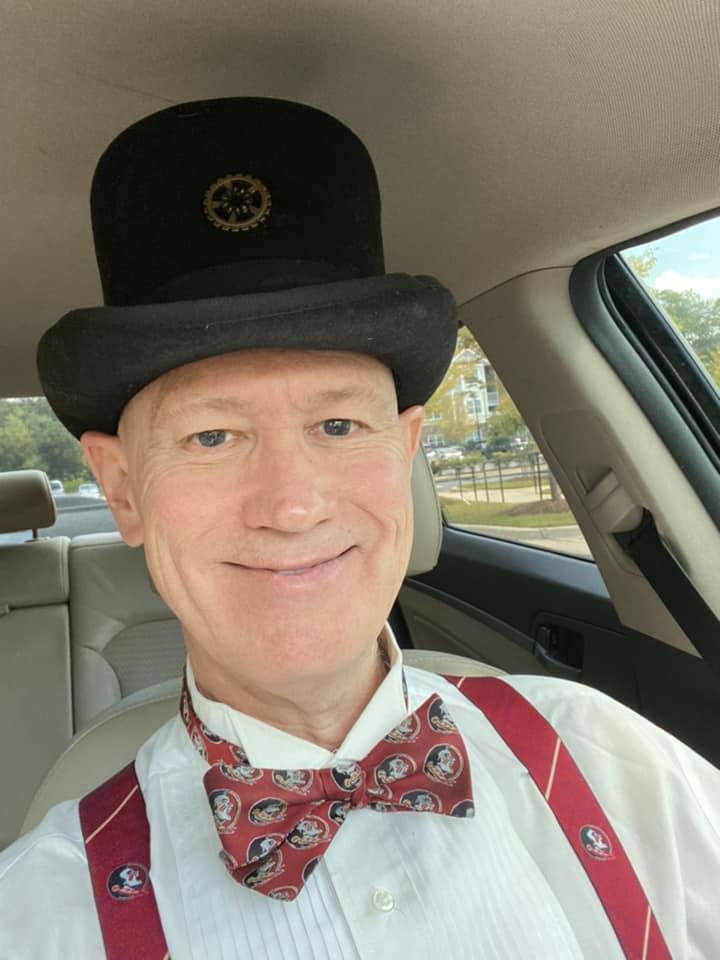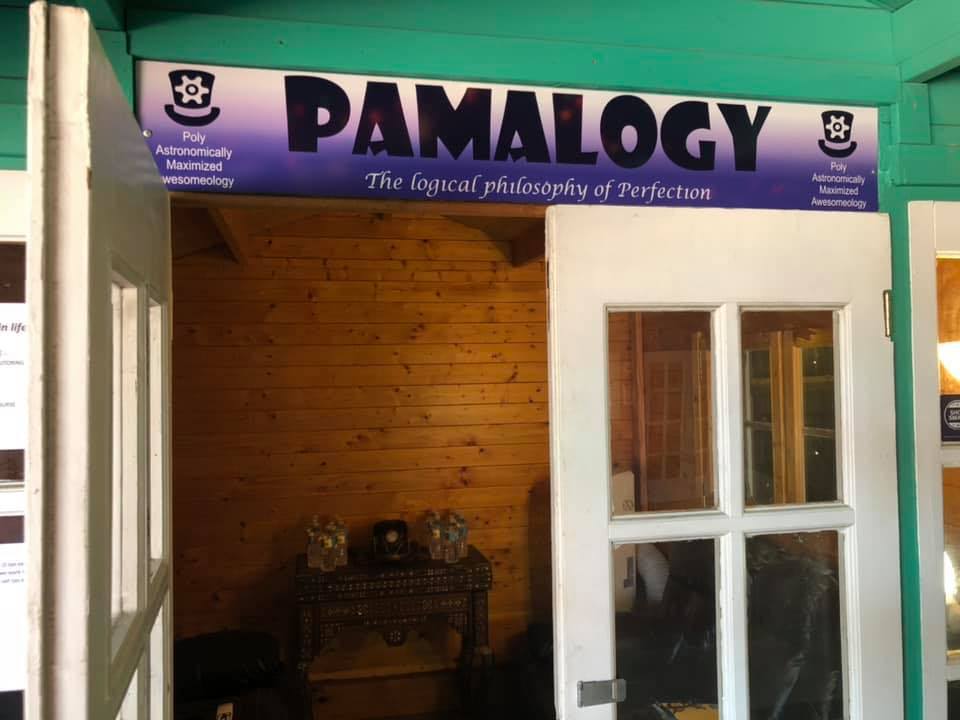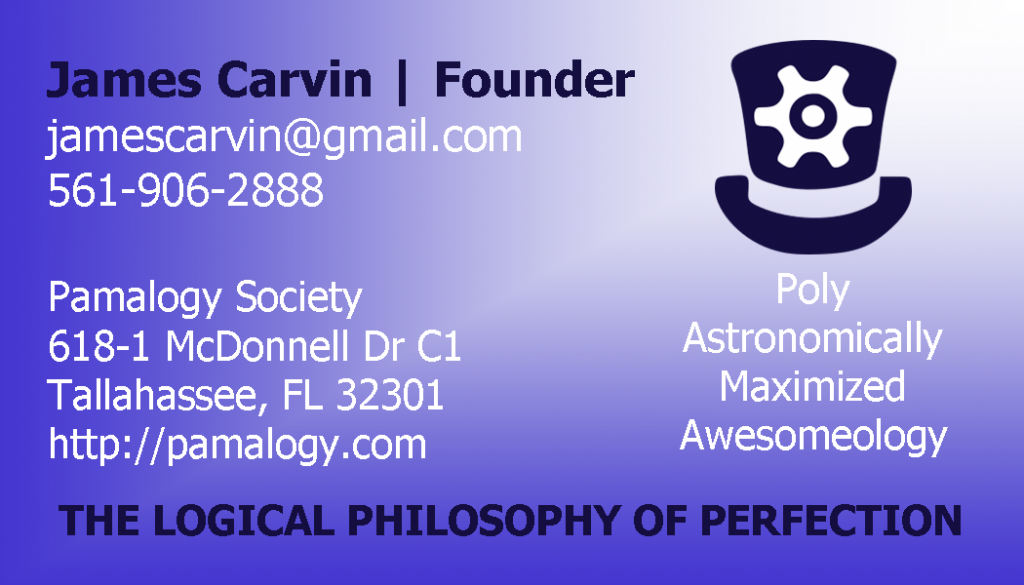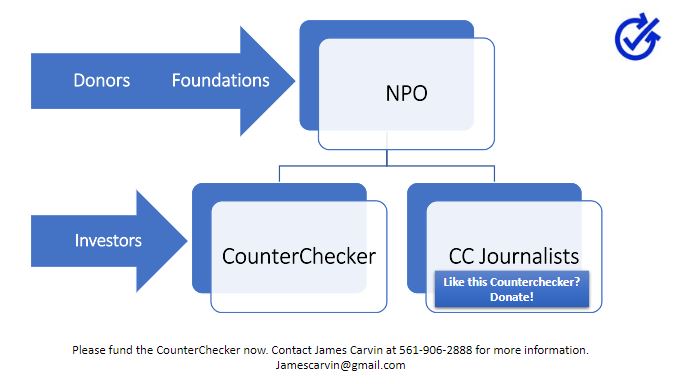
I get asked what Pamalogy is around five to ten times a day as I Uber in Tallahassee, Florida. My answer has shifted since a few years ago, when I printed up brochures and sewed a sprocket onto the top hat that I wear every day. The top hat and brochure prompt the question. The brochure itself is about perfection, or the words I prefer, “maximized awesomeness.”
“What is Pamalogy?” they ask.
It is “awesomeology” – the philosophy of awesomeness. It stands for “Poly Astronomically Maximized Awesomeology.”
But I don’t always sense that this is the answer I should give. I don’t want my passengers to think their driver is too heavenly minded to look at the road. Besides, should we start talking about philosophy? They were probably just making polite conversation.
Through the years, I’ve discovered there is a lot less interest in the question of what maximized awesomeness would be in the absolute abstract sense of “perfection” than there is in how people can be the best they can personally. To a lesser extent, they also like to talk about how the world could be improved, or reach its own best potential. They all have their ideas. It’s important that conversations flow in two directions.
Pamalogy is about all of these things. It might help explain what Pamalogy is if I describe a typical day in my life.

My days usually begin with a walk with my dog and my wife, Lisa, where we’ll talk about all sorts of things. Lisa and I have been married since 1990 and in 2003 she had a severe stroke. She is angry at me after all these years because I made a decision on that fateful day to have a surgeon drill a hole in her skull and save her life. In the years following the stroke, she relearned to walk and do some things by herself, while I covered the rest.
Lisa walks with a cane now and was never fully healed from the lingering paralysis in her left side. She has no use of her left arm and drags and snaps her left leg as she walks. The years have now taken their toll on her snapping knee and our days walking the dog will soon come to an end. Maybe that’s why I cherish our time together so much. As a Pamalogist, I know to get the most I can out of life. That little daily dog walk is part of that. It’s part of what “maximizing awesomeness” is for me.
It gets religious, and to be honest, she hates Pamalogy. She’ll find one sad thing after another to prove there’s no such thing as maximized awesomeness. She sees nothing awesome about either her own quality of life or of aging generally. The older we get the more friends and family we see suffer and die. How awesome is that?
It’s a good thing I have Lisa to daily present me with this challenge. She thinks of me as “the spokesperson for maximized awesomeness” because I am the society’s founder. Her disdainful, sometimes mocking looks beg for answers. In life, sometimes words aren’t the answer. Sometimes, simple compassion is the answer. I touch her soft shoulder with an inexpressible thought of love. I look into our future and it seems even more difficult than our past, but my faith and hope just keep growing.
It isn’t all faith. Pamalogy is founded on logic. Logic provides a theoretical knowledge, even certainty, and in that moment – touching her, wishing her freedom from suffering and a better life than what she sees, two worlds intertwine in my mind: a world of theoretical certainty, and a world of experience.
I’d love it if more people took interest in the theoretical side of Pamalogy. The theory of Pamalogy understands conscious experience to be a sharing of snippets drawn from the totality of time-and-space-transcending Maximized Awesomeness. But most people don’t think about such things. Their minds center around what they can see. I’ve canvassed this concept. It’s blown more than a few minds away, but the majority are not interested in metaphysics. Pamalogy doesn’t jibe with Lisa’s version of reality or concern either. She doesn’t believe in a Multiverse. Most people don’t. It doesn’t matter if it’s logical to me. She doesn’t find it in the Bible. What she finds in the Bible is the concept of hell.
More people believe in hell than in the Multiverse.
Few people ask, but for those few … on the theoretical side of things, Pamalogy would say hell was possible if and only if there was some good thing to come of it. It might even say hell was logically necessary on that account – so that every good possibility could take place. As a logical philosophy, it would then be forced to ponder why bad things happen. Why hell’s torments? Why Lisa’s suffering? Does including all possible good things in Maximized Awesomeness have to mean including so many bad things?
Here’s a question to ponder. If my compassionate touch on my suffering wife’s shoulder is a good thing in the realm of all possible manifestations of love, how can this take place without my wife suffering?

Many cosmologists embrace a many-worlds theory, wherein every possibility takes place. Chat with a quantum physicist sometime and see. But have they considered that every possibility includes every manner of hell? … even those with no silver lining? I have.
I don’t agree with them. My view is quite different. It doesn’t just accept quantum theory because that is what science is telling us. It explains what science is telling us from a foundational perspective, where there is a logical reason why every possibility doesn’t become reality. Only a logical selection of possibilities becomes reality. And the logic has to do with maximizing awesomeness.
The foundational perspective of the Pamalogist offers a theodicy that you may not previously have heard. For those readers who don’t know, a “theodicy” is an explanation for how God can exist, yet allows evil to exist.
My theodicy relies on a distinction between imaginary worlds and real worlds. An imaginary world is hypothetical. It never really happens. It may seem real, but it is not. Only real worlds are real. We experience this when we dream. We wake up and realize we were in an imaginary world that seemed so real. If evil happens only in dreams, God is not the author of evil. Evil has never happened.
Would you create a Universe without evil if you were God?
Think about it. Just imagine for a thought exercise that you were omniscient and omnipotent. What would you do if you were God? I know the question borders on blasphemy, but just for the sake of a thought experiment, please consider what sort of responsibility you would have if you had the knowledge of all things and the power to do anything at all.
What if before doing anything at all, you thought through every possibility and sorted out which possibilities would be the best to make real, and chose the best of all possibilities to make real? So, you did it. Does that sound like something God might do? Do you believe God might have thought things through that way before acting? I not only think he would, I would say that the whole expectation we have of God is that we all regularly play God by judging either that he can’t exist because there is evil, or that he’s not to blame for it. We make this assumption because we define God as being wholly without blame. We all play God that way. So step back again, and imagine being able to do anything and knowing every possibility, then choosing which possibilities to make real and which ones to hold back on and keep from becoming real.
There are countless possibilities. Now, assuming concepts such as “good” and “bad” are not just human constructs, but something that would matter to a mastermind that had considered all possibilities, it follows that among things that would be possible, there are three general categories: (1)wholly bad things, (2)things that are partly good and partly bad, and (3) wholly good things that would not be bad in any way. If you were omniscient and omnipotent, and were thus capable of making anything happen, you’d have a choice. Naturally, you’d exclude category 1 and include category 3, but if you excluded category 2 because it had bad things, then you would have to sacrifice the good things only category 2 had. This would leave the world with a set of wholly good things, but it would lack all those types of good things only category 2 would have had. It wouldn’t be as good as it could be. That wouldn’t be maximized awesomeness.
So, being smart, as someone who’d considered every possibility and knew which option would be best, let’s suppose you, as God, being able to do all things, came up with a work-around. The solution should be fairly obvious. Include all of the good things in category 2 as reality, and exclude all of the bad things in category 2 as imagination. And, in fact, include all that is good in category 2 as an extension of category 3, which lacks no good thing, as part of its own goodness. Category 2 is thus an imaginary category and the goodness in category 3 is so great that it reaches even into the imaginary and includes its goodness in every imaginary realm, every dream, every hypothetical.
This is what makes Lisa angry. It suggests she is just imagining her own pain. It suggests that suffering in hell is not real. But in that moment, as I touch her shoulder, what I’m thinking is that I’m certain I’m right. It doesn’t make the bad dream seem any less real either to me or to her. It just knows in faith that she is much more than what she realizes she is in that moment of despair. And it doesn’t really matter whether she is willing to agree. One day, I am certain she will wake up from this dream and discover more about who and what she really is. How do I know this? Because it would be good if it were true. And if all good things are real, then it is true.
This is how the Pamalogist walks in strong faith and how metaphysics and experience intertwine. Lisa and I, on our daily walks, have had years to discuss this, but in a ten minute ride from point A to point B, the conversation of an Uber driver only drifts in that direction if the passengers ask questions or make comments that lead it there. More commonly, the conversation is about what the Pamalogy Society is. I’ve given almost 30,000 rides. If the average number of passengers is 1.5, that’s 45,000 passengers. I think it’s fair to say that discussion about Pamalogy has taken place in 1 ride out of five, which means this sort of conversation has taken place about 9,000 times to varying degrees. Since the driver can’t be too assertive in leading conversations, I’ve come to reduce my answer to “it’s an incubator.”
Of course, when the question is about my top hat, and not about the brochure, then the question is different. If it’s not just a compliment, or someone asking where they could get one, it’s most often a question of why I’m wearing it. Some riders make jokes about Mr. Peanut or the Monopoly guy. Others ask me if I do magic tricks. “It’s definitely a magic hat,” I assure them. “The wearer of this hat must ask what to wear with it and what occasion is appropriate for that outfit. That demands they consider what things in their life would bring about those occasions.”
“Oh my God, that’s awesome,” they’ll often exclaim! “Best Uber driver ever!”
Of course, I know they say this to many of their Uber drivers, but if the moment seems right I’ll continue … “It all starts with the hat. It’s a thinking cap, hence the sprocket. See here, the hat with sprocket on my business card.”

This is why so many get into the car saying they remember me or they’ve heard about me, saw me on social media, and the like. It’s encouraging, but what I’d really like is for them to remember riding with me when the programs the Pamalogy Society incubates become household names. Then they would really see the power of that hat to change the world.
The programs are listed at JamesCarvin.com. The first program on the list is the CounterChecker. As an incubator, the Pamalogy Society will support one program listed at JamesCarvin.com at a time. The programs will generate funds for the Society, which will hold shares, so it can provide seed funds for the next programs on the list. Most of the programs are for profit and should offer dividends. I will receive a modest salary from the Pamalogy Society as its Executive Director and I will donate my time as a Pro Temp CEO for each program as it is getting started. I will own some shares in those companies as will the Pamalogy Society. My hope is that there will be quite a bit of value in those shares.
I still haven’t started asking for money but I’m about to. The CounterChecker is now being incubated through Domi Station, in Tallahassee, and I’ve also joined the Institute for Nonprofit Innovation and Excellence (INIE) to prepare a well run nonprofit. A 501(c)3 application will be filed very soon. Expect announcements. For now, it remains for me to explain what incubation has to do with maximizing awesomeness and why it is that lately, when people ask what the Pamalogy Society is, I describe it as “an incubator.”
First, let me explain what I don’t mean. To me, the word “incubation” can mean a lot of things. There are many types of incubator programs and they are often sponsored by governments, supported by tax dollars. Typically, an educational program will be provided that lasts a certain number of months and the new company will receive help from experienced mentors and gain access to subscriptions for business services for free or at a discount. In many cases, they can share workspace and various benefits from an entrepreneurial start up environment. Those are the types of services provided by Domi Station. Those types of services are crucial for starting up a business. Very typically, after a business team is ready, investors will hear their pitch and provide the capital they need to get started. That is why I am getting all that I can out of Domi Station. It is with that hope. However, when I use the word “incubator” as it applies to the Pamalogy Society, I mean something different.
So far, no CEO has stepped up to offer to get my business started for me, neither for the Pamalogy Society nor for the CounterChecker. Having qualified team members is a key ingredient in starting a business. The Pamalogy Society will actually do that for the programs listed at JamesCarvin.com. Neither does Domi supply funds. On the contrary, they ask for membership fees, which I’ve paid myself out-of-pocket, gladly so, since the benefit is well worth the price. But by contrast, the Pamalogy Society will actually fund the initial phases of operation for the companies it incubates. These are two major differences.

Third, there is the matter of extent. The scope of help the Pamalogy Society will offer to these programs as they begin, is to make sure all prototypes are built. That is, it covers Research and Development. There may be some other capital expenditures associated with start up expenses it will cover as grants or loans, as well. The only thing it will not cover is ongoing expenses directly related to per unit sales and overhead. The business models are all designed to be profitable in their ongoing operations.
With that as a framework, it remains to consider the targets. There are about forty projects listed at JamesCarvin.com and I won’t repeat the list here. I will simply point out that each of the programs are innovations that would make this world a better place for everyone if they were successful. They are also strategically chosen to enhance one another as they are systematically released. The first project to receive assistance will be the CounterChecker, which is a fact-checking tool for fact-checks. While, at first site, this may not seem like the most important change in the world there could be, it is very strategic in terms of leveraging the other projects. Fact-checking also matters more than you may realize, or would anyway, if the technology was improved. And that is what the CounterChecker will do.
Let’s look into this. In a world full of fake and inaccurate news, it would be helpful to have a mechanism that makes corrections. The present model uses hired reporters to research facts and assertions. We suppose that since they have done research that their work should be sufficient to determine what the facts are and whether something can be considered the truth. But that is not the case. Anyone who has ever heard a court proceeding knows that both a defense and a prosecution have evidence they could present and it is all based on research. The current way of doing fact-checking involves no rebuttals, no cross-examination and is usually comprised of a very limited amount of information. The CounterChecker will be an industry disrupting technology that puts opposing teams in dialog. It will assist in the discernment of truth in a more binocular fashion.
It seems appropriate to me that the first project the Pamalogy Society should fund and support is a truth machine. Perhaps the existing fact-checking organizations are already telling us the truth. Perhaps, they are not biased at all. However, studies have shown that the public has very little confidence in this. The CounterChecker will help them to restore public trust in their work by disrupting the industry with a tool that is inherently fair.
Given that incubating programs at JamesCarvin.com is the primary thrust of what the Pamalogy Society will actually do in the course of the coming years, I think it is important to introduce it as a whole picture. It does have a metaphysical side. It even has a unique theodicy, but that side doesn’t really have much bearing on its daily activity other than to challenge each one of us to maximize our awesomeness and to work together to explore ways we can do so.
That is why now, when someone asks me what the Pamalogy Society is, I tell them it is an incubator. It is one thing to talk about other worlds. It is another to talk about our own, and what we could do to improve it and then take action. There are many things people could do that would make this world a better place. And if the good in it is real, then it doesn’t matter if the rest is imaginary. We have an opportunity to live the dream, and we should. I’ve spent my life attempting to make my dreams come true but I lacked the help I needed to make that happen. I’ve had to let let dozens of world changing ideas elude me because there was no Pamalogy Society to help me. There is no reason I should be driving an Uber for a living in my sixties to support my disabled wife. The Pamalogy Society could help people in my situation. It remains only for me to invite you to add your own world-improving ideas onto my list now that you have an idea of what Pamalogy is. And if you have any questions about how you could maximize your personal awesomeness, consider me a helpful friend. Maybe we could discover that together.


